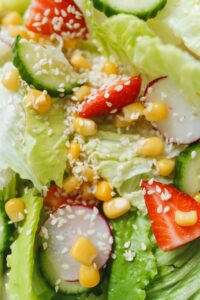In today’s fast-paced world, maintaining a balanced diet can seem like a daunting task. However, balanced nutrition is the cornerstone of a healthy lifestyle, impacting everything from energy levels to mental clarity. This guide will provide you with the knowledge and tips you need to eat your way to wellness, ensuring you get the nutrients your body needs to function optimally.

Understanding Balanced Nutrition
Balanced nutrition involves consuming a variety of foods in the right proportions to maintain health, energy, and overall well-being. This means incorporating all the essential food groups: proteins, carbohydrates, fats, vitamins, and minerals. A well-balanced diet not only supports physical health but also promotes mental and emotional well-being.
The Core Components of a Balanced Diet
- Proteins: Proteins are the building blocks of the body, crucial for repairing tissues and building muscle. Include lean meats, fish, eggs, beans, and nuts in your diet to ensure adequate protein intake.
- Carbohydrates: Carbs are the body’s primary source of energy. Opt for complex carbohydrates like whole grains, fruits, and vegetables, which provide sustained energy and essential nutrients.
- Fats: Healthy fats are essential for brain health, hormone production, and overall cell function. Include sources like avocados, olive oil, nuts, and seeds in your diet while avoiding trans fats and excessive saturated fats.
- Vitamins and Minerals: These micronutrients are vital for various bodily functions, including immunity, bone health, and wound healing. A diet rich in fruits, vegetables, and whole grains will help you meet your vitamin and mineral needs.
- Water: Often overlooked, water is essential for hydration, digestion, and nutrient transport. Aim for at least eight glasses of water a day, more if you are active.

Creating a Balanced Meal Plan
Creating a balanced meal plan involves understanding portion sizes and making thoughtful food choices. Here’s a simple framework to follow:
Breakfast
Start your day with a balanced breakfast to kickstart your metabolism and provide sustained energy. A good breakfast might include:
- Oatmeal with fresh fruits and a handful of nuts.
- Whole grain toast with avocado and a poached egg.
- Smoothie made with spinach, banana, protein powder, and almond milk.
Lunch
For lunch, aim for a combination of lean proteins, whole grains, and vegetables:
- Grilled chicken with quinoa and a mixed vegetable salad.
- Lentil soup with a side of whole grain bread.
- Salad with mixed greens, chickpeas, cherry tomatoes, cucumber, and a light vinaigrette.
Dinner
Dinner should be lighter than lunch but still balanced:
- Baked salmon with sweet potato and steamed broccoli.
- Stir-fried tofu with brown rice and assorted vegetables.
- Whole wheat pasta with a tomato-based sauce, lean ground turkey, and a side of green beans.
Snacks
Healthy snacks can help maintain energy levels throughout the day:
- Greek yogurt with honey and berries.
- Hummus with carrot sticks and cucumber slices.
- Apple slices with almond butter.
Tips for Maintaining Balanced Nutrition
- Plan Ahead: Meal planning can save time and ensure you have healthy options available. Prepare meals and snacks in advance to avoid the temptation of unhealthy choices.
- Read Labels: Pay attention to nutrition labels to make informed choices. Look for items with low added sugars, healthy fats, and high fiber content.
- Mindful Eating: Eat slowly and mindfully, paying attention to hunger and fullness cues. This can help prevent overeating and promote better digestion.
- Moderation: Allow yourself occasional treats in moderation. A balanced diet doesn’t mean deprivation but rather making healthy choices most of the time.
- Stay Informed: Nutrition science is always evolving. Stay updated with reliable sources and consider consulting a nutritionist for personalized advice.
Conclusion
Achieving balanced nutrition is a journey, not a destination. It involves making conscious food choices, understanding nutritional needs, and creating sustainable eating habits. By incorporating a variety of foods and focusing on whole, unprocessed options, you can eat your way to wellness and enjoy a healthier, more vibrant life. Remember, the key to balanced nutrition is moderation, variety, and mindfulness in your eating habits.
Incorporate these principles into your daily routine, and you’ll be well on your way to achieving optimal health and wellness through balanced nutrition.
